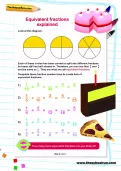Important update from TheSchoolRun
For the past 13 years, TheSchoolRun has been run by a small team of mums working from home, dedicated to providing quality educational resources to primary school parents. Unfortunately, rising supplier costs and falling revenue have made it impossible for us to continue operating, and we’ve had to make the difficult decision to close. The good news: We’ve arranged for another educational provider to take over many of our resources. These will be hosted on a new portal, where the content will be updated and expanded to support your child’s learning.
What this means for subscribers:
- Your subscription is still active, and for now, you can keep using the website as normal — just log in with your usual details to access all our articles and resources*.
- In a few months, all resources will move to the new portal. You’ll continue to have access there until your subscription ends. We’ll send you full details nearer the time.
- As a thank you for your support, we’ll also be sending you 16 primary school eBooks (worth £108.84) to download and keep.
A few changes to be aware of:
- The Learning Journey weekly email has ended, but your child’s plan will still be updated on your dashboard each Monday. Just log in to see the recommended worksheets.
- The 11+ weekly emails have now ended. We sent you all the remaining emails in the series at the end of March — please check your inbox (and spam folder) if you haven’t seen them. You can also follow the full programme here: 11+ Learning Journey.
If you have any questions, please contact us at enquiries@theschoolrun.com. Thank you for being part of our journey it’s been a privilege to support your family’s learning.
*If you need to reset your password, it will still work as usual. Please check your spam folder if the reset email doesn’t appear in your inbox.
Managing separation and divorce at school

How should you inform the school about separation or divorce?
Sending a joint letter to the headteacher is the first thing to do, but sometimes speaking to the class teacher in person is also a good idea. ‘It’s always important to let a class teacher know of any change of circumstances that can affect a child,’ says Sara Hassle, spokesperson for family advice and information charity Family Lives. ‘A face to face meeting can be daunting when you are feeling so stressed and upset, so even making a phone call is better than a letter. There may be things that the school have noticed about your child which can then be spoken about. An appointment is often more helpful because the child can be part of the discussion, depending of course on their age.’


Start a unique learning programme!
- Weekly programme for each school year
- Worksheets sent direct to your inbox
- Keeps your child's learning on track
Some schools have a trained teaching assistant or teacher available to talk to for youngsters in a difficult situation. ‘School will often be seen by the child as their ‘safe place’ and this may help them to open up,’ says Ms Hassle. ‘Children can feel very overwhelmed by all that is happening and this leaves very little space to think and therefore learn.
There can be a marked decline in the child’s behaviour and ability to get on with friends during this time, so all information is useful to the school to counteract this.’
What if there is animosity between the parents?
The school needs to know who the primary carer is and who else is allowed to pick up the child from school. Teachers also need to know if one of the parents is likely to try to remove the child from school without permission. Emergency contact details must always be kept up to date.
Should you provide your child's teacher with regular updates?
These are a good idea, advises Ms Hassle. ‘There are often situations where parents continue to live in the same home after separating due to joint tenancies and mortgages. Regular catch-ups with both parents – either together or separately – are very useful and help children feel they are still at the centre of their parents’ lives even if they are not together anymore.’
What happens at parents’ evening?
It’s better if the separated parents can attend together and many do put on a united front for parent-teacher meetings. But if a parent feels they cannot concentrate properly because they are feel so uncomfortable at sitting alongside an ex-partner, it’s worth sending in a request for separate meetings. ‘A school isn’t automatically obliged to supply separate meetings, but if domestic violence has been involved in the split, then they would accommodate separate meetings,’ says Sonny Patel, solicitor in the family law department of Seddons Solicitors.
What about school trips?
Both parents need to give consent for school trips. If one parent didn’t give their permission and the child was hurt during the trip, then theoretically the school could be open to being sued.
How can you deal with an argument over choice of secondary school?
‘This is a key decision in the life of a child and fall-outs over choice of school can be common,’ says Mr Patel. ‘If the parents cannot agree between themselves, one or both needs to seek a specific issue order.’ If attempts at mediation then fail to find an agreement, the parent needs to set out in writing why their preference is the best way forward for the child – perhaps the child is talented at the arts or would be better suited at a school specialising in science. If the disagreement persisted, the decision would be made by a judge in the family court. The child’s wishes would also be taken into consideration. No legal aid is available for this course of action.
What if the child’s surname changes?
‘Sometimes a parent wants to revert back to their maiden name or they meet someone else and want to get married,’ says Mr Patel. ‘The school should not change the child’s surname on the register without evidence that the other parent has given their consent.’








